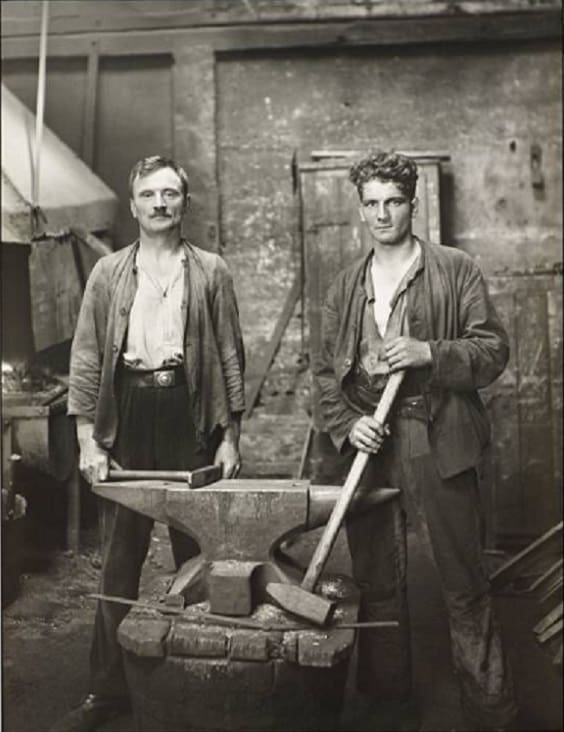[…] Read the full article today at Catholic Gentleman. […]
A blog for Catholic men that seeks to encourage virtue, the pursuit of holiness and the art of true masculinity.
Iron Sharpeneth Iron

“Iron sharpeneth iron, so a man sharpeneth the countenance of his friend.” Proverbs 27:17 (Douay-Rheims 1899 American Edition)
I’ve always enjoyed this scripture passage for several reasons. First, it drives home the point of being on guard and ready to debate and philosophize with our Christian brothers and sisters. Second, it’s an exhortation to keep close to our friends and support them when we know there are troubles brewing in their life. Last, it mentions iron. Yes, that may seem to be a shallow reason for inclusion, but most men are fascinated by metal, and by the end of this short musing you’ll see there is more to it than the first glance may expose.
Metal is my business. Understanding the physical, chemical, and mechanical properties on a daily basis is the currency that I deal in. That may seem miles away from scripture, but once again, one’s patience in setting up this line from scripture will certainly bear the fruit of a fresh perspective.
I would like to call your attention to one of the most obvious properties of iron that we can all, most likely, say we’ve seen: rust. Iron corrodes when exposed to the elements, and we’ve all seen the bright orange or red hues on our vehicles, on some sad piece of equipment rotting away in a field, or on a long-forgotten tool in our garage.
Do our souls bare the rust of abuse or neglect by being exposed to the elements of this world? Have we begun to corrode from the inside out? Do we maintain a shiny exterior only to know at the end of the day we allow the vitriol of sin to pit and crack our very conscience? We should ask ourselves all of these questions, and I pray that now we can begin to see the deeper significance of this line from Proverbs. Let us not become rusty through sin and neglect of the word of God.
There is another property of iron that bears mentioning, and that is the ability to abrade itself. As one takes two like pieces of iron (without getting too technical and for the sake of argument assume these pieces of metal are alike in all manner) and rub them together, one does not preferentially abrade the other. They both begin to wear upon the other and remove the surface impurities, defects and high spots until they become smooth.
Does it not seem then that, through this smoothness and removal of all defects, the iron shines brilliantly in the light of the sun? So, too, does our engagement with those who love Christ, especially priests, begin to abrade away our defects through constant challenging, admonishment, and confession. These acts leave us weary and worn – but worn to a brilliant sheen – so that we can reflect the dazzling light of the Son to others.
One final point I’d like to make is the wonder of God’s creation, especially when it comes to the order of nature. While the previous points show the properties of iron on a macro scale, it is the micro scale that things become even more interesting. There is a beauty and order that shows us that nature is most definitely not random.
Iron can be manipulated to have specific properties depending upon the composition, how it is cooled or heated, or even through mechanical manipulation. One of the common structures in iron is call Pearlite. If polished and etched, it appears as pearl or opal (hence the name). Viewed under a microscope, one can see layer upon layer of different iron phases that give this pearlescent look. While regarded as a cheap material, it can be a “pearl of wisdom” if one is willing to look for it.
Revisit some of your favorite lines of scripture, and realize that just like a macro view may give you one perspective, a microscopic view may give you an altogether unfathomable experience of God’s wonderful creation.
Don’t Miss a Thing
Subscribe to get email notifications of new posts and special offers PLUS a St. Joseph digital poster.
Related
COMMENTS
Reader Interactions
Comments
Trackbacks
-
-
[…] post Iron Sharpeneth Iron appeared first on The Catholic […]
-
[…] with many things in my life, I have given more thought to a recent post. I left you, the reader, hanging, and on purpose I might add. I wanted to follow up with another […]
-
[…] with many things in my life, I have given more thought to a recent post. I left you, the reader, hanging, and on purpose I might add. I wanted to follow up with another […]
-
[…] with many things in my life, I have given more thought to a recent post. I left you, the reader, hanging, and on purpose I might add. I wanted to follow up with another […]
-
[…] I was also surprised that a cursory Googling didn’t turn up much on this subject with regards to female friendship. I did learn quite a bit about metallurgy and the meaning of this metaphor from a post at The Catholic Gentleman: […]
“I was twisted iron. I entered the religious life to be straightened out.” – Saint Aloysius Gonzaga
Great article! Marvelous scientific and poetic insights on the ethereal through the material.
What a great quote!
Thanks! Saint Aloysius always has some gem (to continue with the metallurgical analogy).
Good read! Thanks.
Comes to mind a passage in Chesterton talking about Purity and how generally this Virtue is seen as a delicate lily. Our writer then opposed that Purity to him was more like a steel blade that needed constant hard work, terrible trial by fire and sudden quenching to become any worthy.